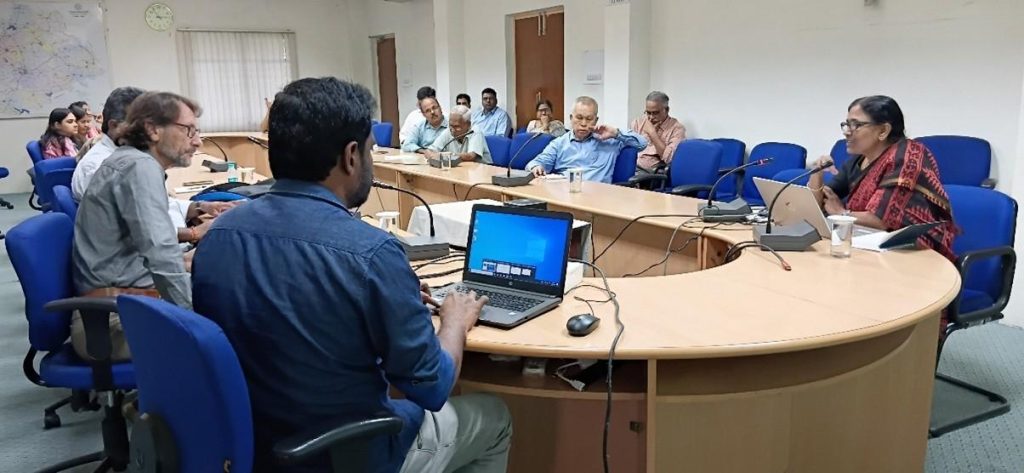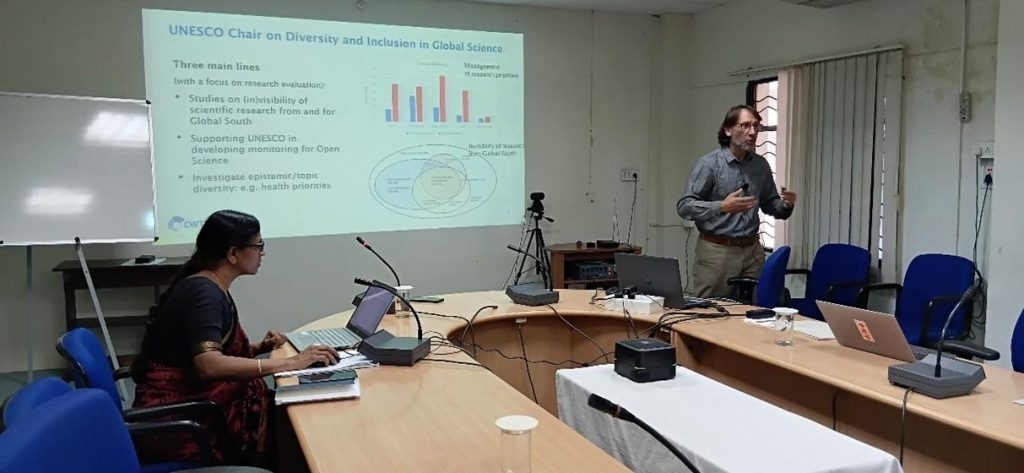

Centre for Economic and Social Studies (CESS) hosted a talk by Dr. Ismael Rafols Garcia (INGENIO, Universitat Politècnica de València; UNESCO Chair on Diversity and Inclusion in Global Science; CWTS, Leiden University) on “Alignment and Misalignment between Research Agendas and Societal Needs: Why Diversity and Inclusion Matter” chaired by Prof. E. Revathi, Director, CESS.
Dr. Rafols outlined three broad perspectives under the UNESCO Chair—(1) studies on the (in)visibility of research from and for the Global South, (2) supporting UNESCO in monitoring for Open Science, and (3) investigation of epistemic and topical diversity, notably in health priorities. He argued for pluralistic, contextual research assessment that privileges qualitative evaluation and responsible use of indicators, and highlighted reform initiatives such as the Coalition for Advancing Research Assessment and regional efforts like FOLEC in Latin America.
Drawing on the UNESCO Recommendation on Open Science (2021), Dr. Rafols stressed that open science must go beyond access to include participation and benefit: open publications, open data, open educational resources, open-source tools and supportive physical and virtual infrastructures. He emphasized meaningful dialogue with local communities, indigenous knowledge systems and marginalized scholars, and the engagement of societal actors through citizen and participatory science, crowdsourcing and participatory research to ensure equity, integrity and shared benefit.
A central theme was epistemic inequality and concrete evidence of misalignment between disease burden and research output. Using Disability-Adjusted Life Years (DALYs) as the burden measure and drawing on collaborative work with the Indian Institute of Science (Kumar et al., 2023), Dr. Rafols presented charts comparing the percentage share of DALYs and the percentage of related publications for major conditions such as cancer and cardiovascular diseases. At the global level, publications often exceed the share of disease burden; high-income countries produce a disproportionate amount of research compared to their actual burden; upper-middle-income countries are increasing research output but still tend to follow Northern research priorities; India carries a significant burden of disease yet contributes a relatively modest share of related publications; and low-income countries face large disease burdens with minimal research representation. As an example, this mismatch is especially visible in the case of cardiovascular diseases, where the burden is high in many low- and middle-income regions but research efforts remain comparatively limited.
Through the STRINGS (Steering Science Technology and Innovation towards Sustainable Goals) project cases (rice research, Lake Victoria fisheries, podoconiosis), Dr. Rafols illustrated how technical research priorities can overlook local needs and simple, high-impact interventions. Research must be assessed for its alignment with societal needs, recognizing that stakeholders hold diverse perceptions of challenges and priorities.
Yet, the benefits of science are often unequally distributed, favouring dominant countries, groups, or genders. To address this imbalance, initiatives like Living Labs are vital. By engaging directly with communities, identifying local problems, and co-developing solutions, they foster equity, inclusion, and more socially relevant research outcomes. The talk concluded with an insightful discussion among the faculty, researchers, and scholars.
